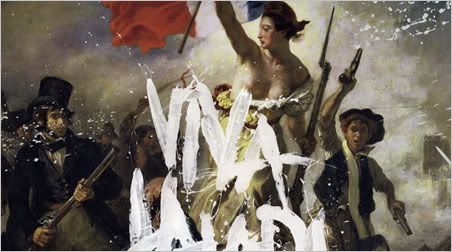
“Lost!”
from the album Viva La Vida or Death and All His Friends
2008
iTunes
Several songs on Coldplay’s fourth album, Viva la Vida or Death and All His Friends, find frontman Chris Martin obsessed with the idea of coming close but not quite getting all the way to heaven. And that’s about as good a summation as there is of the British pop-rock quartet’s attempt to stretch out.
Martin and his cohorts take some entertaining detours from the platinum-plated, arena-anthem formula of their previous releases, but the brass ring of total creative nirvana just scrapes by their fingertips. Still, the impulse to explore sonic avenues that don’t lead directly to Martin’s angelic falsetto and rollicking piano is a good one.
Partial credit goes to the band for its willingness to abandon its money-printing ways and to coproducer Brian Eno, whom the band claims it sought out to give it a kick in the sensitive-man pants. But, really, who are they kidding? Eno coproduced the boundary-broadening fourth album for Coldplay idols U2. His number was up.
Eno, copiloting with Rik Simpson and Markus Dravs, a master of both the sweeping and the constricted, brings to the table exactly what you’d expect. Whether it’s the tickingly percussive opening keyboard wash on the mostly instrumental “Life in Technicolor” to the high-toned, reverb-drenched guitars of “Cemeteries of London” or the pillowy dreamscapes of “42,” he doesn’t push Coldplay out of its cozy home as much as he rearranges the furniture therein.
The best of the experimentation comes on the album’s apex, “Yes.” While never taking his eyes off the prize of a strong melody and a singable hook, Martin investigates the very low end of his register to compelling effect on this dark yet energized plaint about loneliness. Guy Berryman manipulates his bass strings like taffy, Jonny Buckland offers up smudges of slide guitar, and the producers saturate the whole thing in a sinuous, Eastern-tinged “I Am the Walrus”-style strings and tablas arrangement.
But “Yes” leads into the “hidden track”: “Chinese Sleep Chant,” a three-minute jumble of electric-guitar jangle and spectral cooing. It’s one of several abrupt gear shifts that feel more like gear grinds.
“Death and All His Friends” also morphs without obvious purpose from a pretty piano ballad to a plucky orchestral interlude that wouldn’t sound out of place in a Brat Pack movie. It eventually eases into a reprise of the furiously flitting keyboard sounds of the opening track. Two of the pieces of that particular puzzle sound cool enough but knitting them together — again without noting in the back cover that the final piece of the song is another “hidden track” called “The Escapist” — just makes them feel disjointed, like the band is choosing edgy form over musical function.
Other experiments in mood are more seamless, like “Lost!,” which offers a combination of somber Arcade Fire-like church organ, a scrabbling groove, and uplifting lyrics and handclaps. The curves also work on “42” as it rises from gauzy to busy before landing softly.
The album ends with a spin on “The End” by the Beatles, with Martin crooning “and in the end we lie awake and we dream of making an escape.” Viva La Vida is just such an escape, a dreamy place to visit. And if it’s not quite perfect, at least you get the sense that the members of Coldplay gave it their best shot.


